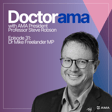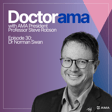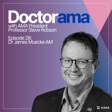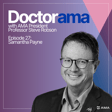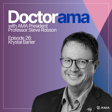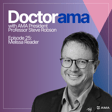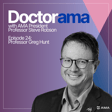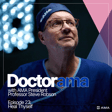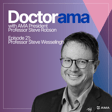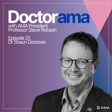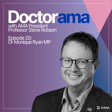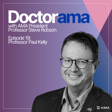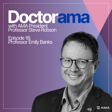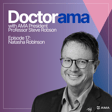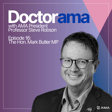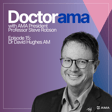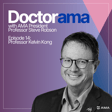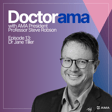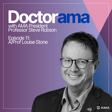Become a Creator today!Start creating today - Share your story with the world!
Start for free
00:00:00
00:00:01

Episode 12 - Dr Anne Tonkin
In episode 12 of Doctorama AMA President Professor Steve Robson chats with Dr Anne Tonkin.
Recommended
Transcript
Steve's Mental Health Concerns
00:00:00
Speaker
Well, I've been a medical practitioner since 1987. I had some problems with mental health when I was an intern. And from that day, I've had a little bit of an apprehension about the medical board. I know when I go around and talk around the country, lots of other people, a lot of my colleagues also have similar concerns about the medical board. Well, I'm not one to take this line down and we're going to go right to the source today on Dr. Rama.
00:00:29
Speaker
You're listening to Dr Rama with Steve Robson, bringing you the best of health, medicine and people.
Introduction of Dr. Anne Tonkin
00:00:37
Speaker
Well, I'm pleased to say my Christmas guest here today is Dr Anne Tonkin, who's the chair of the Medical Board of Australia. Anne, welcome. Thanks very much, Steve. Look, I just wanted to start. I'm sure a lot of people have seen you and know who you are, but really have no idea.
00:00:54
Speaker
how you got to be where you are. And I know that you're a physician and will work in Adelaide for many years.
Dr. Tonkin's Career Path
00:01:00
Speaker
Talk me through a little bit your pathway to medical practice and how you ended up where you are.
00:01:05
Speaker
Yeah, sure. It was a fairly convoluted pathway. I did a science degree first and honours and then wondered what to do next and managed to get into the new course that was happening at Flinders in the third intake, I think, at Flinders University and did my medical training there and went on to do physician training and a PhD all at Flinders.
00:01:29
Speaker
And then, very luckily for me, a job came up at Adelaide University in the clinical pharmacology department, and that's what I'd done my advanced training in. So I was fortunate to get that job and became a clinical academic, which I stayed for nearly 25 years.
00:01:50
Speaker
at the University of Adelaide. And I diverted from clinical pharmacology to a degree, although I still taught a lot of that, into medical education and managing curriculum and assessment and those kinds of things. I ended up professor of medical education and running the medical education unit.
00:02:09
Speaker
So that was a really interesting pathway. Along the way, I got involved with drug regulation because clinical pharmacologists often go down that path. And I was involved with the committee that decides whether drugs should be marketed in Australia.
00:02:29
Speaker
and the other committee, the Pharmaceutical Benefits Committee, that decides whether drugs should be subsidised in Australia. So I got a lot of experience in analysing data, looking at evidence and regulation generally.
Joining the Medical Board
00:02:43
Speaker
So when the opportunity arose to join the South Australian Medical Board, which was before the national scheme, I took that up as an interesting challenge and really found it very interesting. And so I stayed on the South Australian Board
00:02:58
Speaker
until 2018, having joined the National Board in 2015 and became Chair of the National Board in 2018, at which point I left the South Australian Board because there's only so many hours in a week. Yeah, well, it sounds like you fill your hours very, very well. Tell me a little bit about your PhD. What was your research in it?
00:03:21
Speaker
My research was a clinical project in autonomic issues, autonomic disorders and particularly in relation to postural hypotension in elderly people and the causes of that and the physiology behind that and some ways in which that could be managed.
00:03:41
Speaker
So I went on to have quite a significant interest in autonomic disorders for the rest of my clinical career and I'm no longer doing hospital work because there's a lot to do in this job that I'm doing now. But right to the end of that, a few years ago I was looking at autonomic disorders and blood pressure control and those kinds of things.
00:04:04
Speaker
So Ann, I did a couple of years of registrar training at Flinders. In fact, I did most of my training in Adelaide, but a couple of years at Flinders. And there was a healthy rivalry between Flinders and Adelaide University. You didn't run into any...
00:04:19
Speaker
rivalry issues when you made the jump? Not too much. I was aware that some people saw me as going to the dark side. But fortunately for me, the clinical pharmacologists in Adelaide, a very cohesive bunch. And so we were very busy doing collaborative things between the two departments. And so that didn't turn out to be too much of a stress.
00:04:43
Speaker
Are you primarily based in Adelaide these days and commute or how do you divide
Shift from Clinical Practice to Regulation
00:04:49
Speaker
your time? I do a fair bit of flying but I also do quite a lot of zooming and teams meetings and so on so I spend quite a bit of time looking at my computer screen too.
00:05:00
Speaker
The decision to move from the clinical space to the regulatory space and the medical board, what prompted you to do that? Well, I was doing both for quite a long time. That was quite manageable and it's a good thing to have active clinicians
00:05:19
Speaker
doing regulation because you do remember what it's like to be in clinical practice, but continuing in clinical practice is really important. But what I found when I became chair of the National Board was that the demands on time are so varied and so unpredictable that it was really very difficult to say, well, first afternoons is my, that's my clinic day, you know, I've got to do ward rounds three times a week. You can't
00:05:45
Speaker
do that really you can't fit it in with all the meetings and so on that you have to do so. Somewhat reluctantly I gave away clinical work when I'm about a
00:05:54
Speaker
I think about a year after I became chair of the board. So it's obviously a very big commitment being chair of the National Board and you've had a huge body of work to contend with.
Challenges in Regulating Cosmetic Surgery
00:06:05
Speaker
I'm going to ask you a slightly curly one and feel free to think about how to answer this, but what would you say was the biggest challenge that you faced in your tenure as the chair of the National Board?
00:06:15
Speaker
Yeah that's an interesting question Steve. There is a broad answer and a narrow answer and the broad answer is that the biggest challenge is that you never know what's going to come next. So issues arise seemingly out of the blue sometimes and you have to respond very rapidly to those. The narrow answer I guess is that the biggest one of those was cosmetic surgery which we've been now working on for a couple of years and
00:06:45
Speaker
which was a space which was being operated within by entrepreneurial businesses that promoted medical practice that was not necessarily good practice and that wasn't necessarily well covered by our
00:07:06
Speaker
previous approaches which had relied on the fact that most doctors want to do the right thing and most doctors are ethical and we don't have to say be ethical because they are but there was some activity going on in that space which really suggested that some practitioners were willing to I guess push the envelope a little bit in relation to that and so we had to be more specific about
00:07:36
Speaker
what we thought people should be doing and not doing in that space because there was real patient harm going on there.
00:07:43
Speaker
It's interesting you talk about the work going on for a few years. I'm sure it was on the radar, but there was a huge push from the state and territory health ministers to take very direct action. And you had a very tight timeline to deliver on this. How did you and the team manage to work through all the issues you had to with cosmetic surgery on such a tight timeline?
00:08:09
Speaker
Yeah, it was a really big job and the strategy and policy support team at ARPRA which supports the board and helps us with the writing of standards and so on that the board then amends and discusses and finally approves. They did a fantastic job over a very short time period and I think those people put in a lot of unpaid overtime to be honest.
00:08:35
Speaker
Yeah, I was sort of partially involved in this and was amazed at the amount of work that went through. And I guess all the competing voices you had to deal with, there were so many voices in societies and associations involved in this. That must have been quite a juggle for you.
00:08:54
Speaker
Oh yes, the consultation period was interesting and putting together and analysing all the responses and coming up with the best possible approach was, yes, challenging is the right word for it.
Doctors' Apprehensions About Mandatory Reporting
00:09:10
Speaker
Look, one of the things that I really wanted to talk to you about, and we have spoken about this many times, is about the concern that many
00:09:21
Speaker
Doctors have both from the point of view of seeing one of their colleagues as a patient and doctors who are treating other doctors is around mandatory reporting and I'm sure you get a sense of this. This must be something that comes up regularly in discussions and meetings.
00:09:40
Speaker
that you have. Why do you think so many doctors in Australia are so apprehensive about seeking care or have these concerns that if they go to seek care mandatory reporting means that they could be at risk of losing their registration. Why is this such a big issue do you think? It's a very interesting question and I think that there is largely a sense of
00:10:07
Speaker
not understanding exactly what the mandatory reporting provisions are, and that's not surprising. Not many people read the national law. They have it on their bedside table or anything like that. But I think that the
00:10:25
Speaker
threshold for mandatory reporting is so high that most doctors, if they were seeing a fellow doctor as a patient who they felt was impaired to the point that the national law requires before mandatory reporting kicks in,
00:10:43
Speaker
they would feel an ethical and moral obligation to report that person anyway. And it's only when someone's actually likely to do serious harm. It's not when someone's feeling depressed or where somebody's got a self-limited illness or anything like that. It also doesn't kick in if a person has an illness which could lead to impairment, but they're willing to take some time out
00:11:12
Speaker
get themselves well, get properly treated. We don't need to know about those people either. The only time that there is an obligation for us to know about somebody so that we can protect the public is where somebody has an actual impairment, not just an illness, but an impairment, and there's a really important difference there, that means that they do represent a risk to their patients, a substantial risk to their patients.
00:11:39
Speaker
and they won't take the steps that are required for them to stay safe and their patients to stay safe. If they are not willing to do what's needed themselves, then sometimes we need to step in and help them to do that. And the situations where that mostly arises are situations where somebody may have a cognitive disorder, for example, and has lost insight and isn't aware of how impaired they might be.
00:12:09
Speaker
Usually with physical illnesses, people are more than aware. We've had people, surgeons for example, who will report themselves to say, I've got a tremor at the moment and I'm seeing a neurologist and that's fine, we don't have to do anything about that, they're taking the steps.
00:12:26
Speaker
and when they get their tremor treated then they let us know they just have taken some time off and when they feel that they're able to operate safely again they go back to it and we don't need to know anything more about that. So it's for the very specific circumstance where someone is so ill that they are impaired to the point where they represent a risk to the public
00:12:50
Speaker
and we have the responsibility to protect the public by ensuring through the various mechanisms we have that that person stops practicing, gets treated and gets well enough to come back to practice and you know if that's possible then that's always our goal in matters like this. So for someone to think that if they for example get
00:13:13
Speaker
a bit of depression or a bit of anxiety that they can't go and talk to their GP about that because the GP may feel that they need to report to us. That's actually an exaggeration of the real situation and the GP should not be reporting someone like that.
00:13:29
Speaker
It's only where there's an actual impairment that we want to know anything about them. And I just reiterate, it's only when the impaired doctor is not willing to take the steps that are needed to get better and to be safe that we need to get involved at all. Look, I think that's really, really important because I know when I travel around, there's a lot of confusion and concern.
Understanding Mandatory Reporting Rules
00:13:51
Speaker
And I think you've got some pretty good resources on the medical board website. Is that right?
00:13:56
Speaker
Yes, we do. There's a guide there for treating practitioners to give them a sense of when mandatory reporting does kick in and also a guide for practitioners more generally to let them know what the mandatory reporting provisions actually mean.
00:14:12
Speaker
They're much more accessible if you look at them on our website than if you try to read the national law, to be honest. I'd really highly recommend that anyone interested in this area has a look on the website. I can't imagine how tricky it would be trying to interpret the national law for someone like me. It's great that you've put those in digestible terms for the average person like me.
Stress of Receiving Board Notifications
00:14:37
Speaker
And one of the other things that we've spoken about was a sense that I hear from colleagues that matters that go before APRA, before the medical board, take an interminable amount of time.
00:14:50
Speaker
to sort out and I know that that has been a concern to you and some steps have been taken. Have you got any, I guess, reassurance or advice for listeners from the profession about what ARPA and what the board are doing about the duration it takes to resolve issues at the moment?
00:15:08
Speaker
Yes, we've got some good news too. The really low risk matters, which are matters that are more than likely going to end up with no need for any further action because they're frivolous or vexatious or lacking in substance, those ones. We now have a triage committee and a special intake
00:15:33
Speaker
an assessment team which looks at those and we are turning those around much more rapidly now. So we're getting those ones out of the system and in many cases the first that a practitioner even knows that it exists is when they get a letter saying we had this and it's now gone. We don't need to do anything. We're just letting you know that we had it and there's nothing that needs to be done. No action is going to be taken.
00:16:00
Speaker
And that does away with that feeling of limbo that people find themselves in. Sometimes if they get a letter to say that there is a notification, then they wait for even a few weeks, seems like forever when you're in that situation. So we're trying very hard to get those very low level ones.
00:16:19
Speaker
out of the system very quickly and the current data are heading in the right direction with that. The ones that take a very long time are often the ones where there is a really serious matter
00:16:31
Speaker
particularly when it's potentially professional misconduct and they're the ones where there's sexual boundary transgressions or really serious malpractice. Those ones sometimes need independent opinions, they sometimes have criminal proceedings going on in the background and we often need to put our investigations on hold while the police do theirs because they don't want us
00:16:58
Speaker
contaminating the ground if you like. So sometimes we find ourselves coming back to something like that when the police processes are over and finding that we've had it for a couple of years and there's absolutely nothing we can do about that sadly. So those ones where there is a much higher risk
00:17:17
Speaker
tend to be the ones that go on for a very long time. We're trying very hard to get the lower level ones and the vast majority of notifications about doctors in Australia are low level ones. And I just remind everybody that in something like 80 to 85% of all of those cases, no action is taken, no regulatory action is required.
00:17:39
Speaker
We're trying very hard to get those ones out quickly, but there's not a lot we can do about the ones where there are other processes going on in the background that our processes have to come second to. Feel free not to answer this one if you don't want to, but I had a notification a few years ago now, four or five years ago now,
00:18:03
Speaker
maybe and ultimately totally cleared on everything, which I think is the commonest outcome for doctors. But I found it stressful, really stressful. Have you ever had a notification? And if you have, how did you find it?
00:18:19
Speaker
Yeah, I have had one, Steve, and so I do understand that it's stressful. What I'd dearly like to do is to try to dial down the stress a little bit for everybody, because in many cases, well, as I said, something like 80% of cases, no action is taken by the board, but the person feels punished because they've felt so awful for so long, for how long it's taken to get the answer.
Reducing Stress for Practitioners
00:18:46
Speaker
You know, I'd love to say to people,
00:18:49
Speaker
it's very unlikely that the kind of notification that you've had against you is going to lead to any action. So please don't stress too much about it. And it's very easy to say that. There are a lot of support services around Doctors for Doctors, which you know a lot about. That's available for people to go and talk to someone about it.
00:19:14
Speaker
But I know it's easy to say, don't stress, and very hard to do. And I probably stressed too, although at the time I had the notification I was a member of the South Australian Board. And so I had some insight into the kind of level of problem that would lead to action. So that probably made it not so bad for me. One of the suggestions that's been made to us
00:19:40
Speaker
in a working group that we're looking at with APRA, how we can reduce the distress and the impact on practitioners and on notifiers, because they find it stressful too. One of the suggestions put recently from a practitioner with lived experience of a notification was to say, well look,
00:20:01
Speaker
How about putting up some examples on the website? If somebody got a notification because they were rude to somebody, what's the likelihood that that would lead to action? The answer is very, very low likelihood. If somebody transgresses sexual boundaries, what's the likelihood that that will lead to some action? Well, actually very high.
00:20:25
Speaker
you know if we could put some examples up and they're the two extremes but some in the middle as well that that might allow doctors to to have a look at those and think well mine is more like this than one than that one and so therefore I probably won't have serious action taken and therefore maybe I will be able to feel less stressed as I hate the thought that in protecting the public
00:20:47
Speaker
which we need to do, that's our job, that we are doing that, trying not to be punitive towards practitioners, only taking action that's required to protect the public. And yet practitioners feel so punished by this and so stressed by this. If you've got any suggestions, I'd be more than happy to hear them because it is really, I think, one of the things that I would dearly love to achieve before I finish up in this job at the end of next year.
00:21:16
Speaker
Well, look, we may well get some suggestions from listeners to the podcast
Conclusion and Farewell
00:21:20
Speaker
today. And I want to thank you for taking the time to speak with me today. And I'm sure your words will be widely listened to over the holiday break. Perhaps we could talk again next year. I'm sure there'll be plenty more to talk about, but I want to thank you for taking the time. It's such a busy time of year to talk to me on Dr. Rama.
00:21:50
Speaker
You've been listening to Dr Rama, a podcast produced on Ngunnawal country by the Australian Medical Association. All rights reserved.
